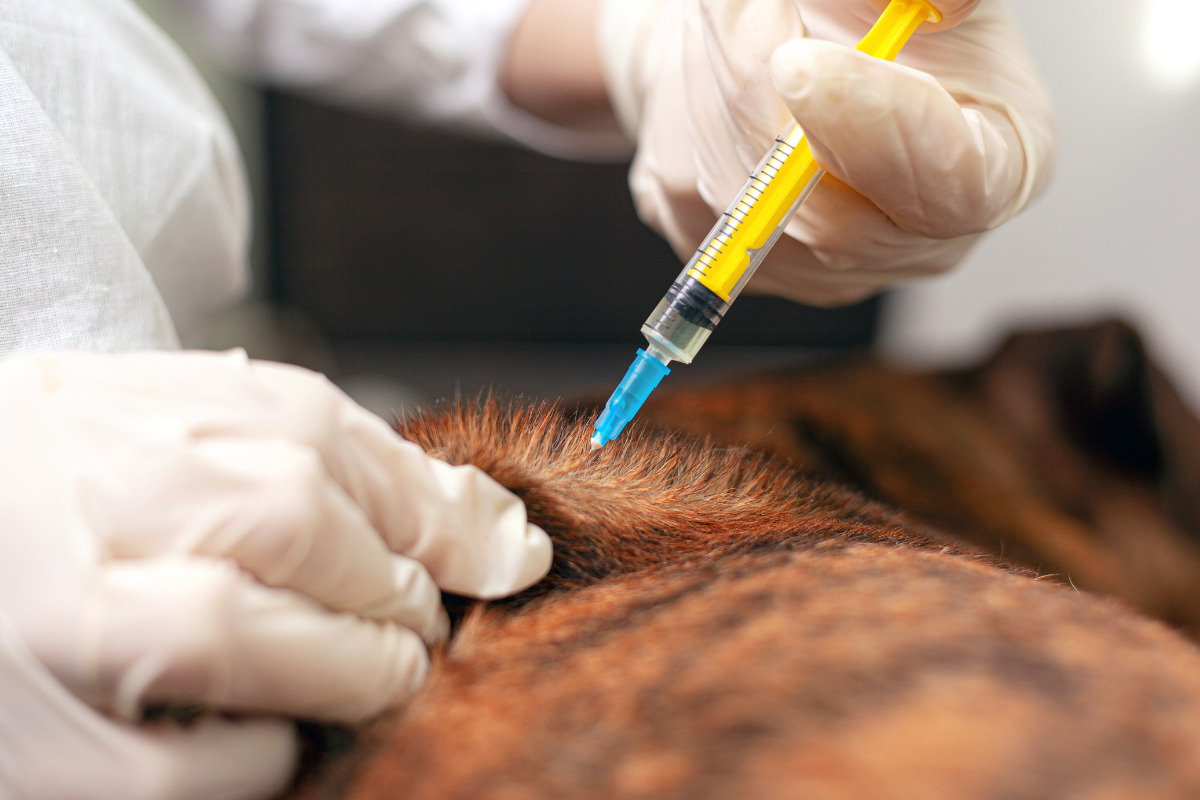Home>Health & Wellness>Common Health Issues>Muscular and Joint Health>How To Prevent Arthritis In Dogs


Muscular and Joint Health
How To Prevent Arthritis In Dogs
Modified: February 21, 2024
Learn how to maintain your dog's muscular and joint health to prevent arthritis. Discover effective tips and strategies to keep your furry friend healthy and active.
(Many of the links in this article redirect to a specific reviewed product. Your purchase of these products through affiliate links helps to generate commission for Pawsomeoldies.com, at no extra cost. Learn more)
Table of Contents
Introduction
Arthritis is a common condition that affects not only humans but also our beloved canine companions. This degenerative joint disease can cause pain, stiffness, and reduced mobility, significantly impacting a dog's quality of life. As responsible pet owners, it's crucial to understand the risk factors, signs, and preventive measures to ensure our furry friends live a comfortable and active life.
Arthritis in dogs, also known as canine osteoarthritis, occurs when the cartilage within a joint deteriorates, leading to inflammation and discomfort. This condition can affect dogs of all ages and breeds, although it is more prevalent in older canines and certain large breeds due to their size and weight-bearing joints.
Preventing arthritis in dogs involves a multifaceted approach, encompassing proper nutrition, regular exercise, weight management, and proactive veterinary care. By implementing preventive measures, pet owners can help reduce the risk of their dogs developing arthritis and alleviate the impact of existing joint issues.
Understanding the nuances of arthritis in dogs is essential for identifying early warning signs and taking proactive steps to maintain joint health. By delving into the signs and symptoms, preventive strategies, and holistic care, we can empower ourselves to be proactive advocates for our furry companions' joint health and overall well-being.
Read more: How To Prevent Fleas From Dogs
Understanding Arthritis in Dogs
Arthritis in dogs, also known as canine osteoarthritis, is a progressive and debilitating condition that affects the joints and surrounding tissues. It is characterized by the deterioration of cartilage within the joint, leading to inflammation, pain, and reduced mobility. This degenerative joint disease can impact dogs of all ages and breeds, although it is more commonly observed in older canines and certain large breeds due to their size and weight-bearing joints.
The primary cause of arthritis in dogs is the gradual wear and tear of the joint cartilage over time. This can be attributed to factors such as aging, genetic predisposition, obesity, joint instability, previous injuries, and developmental disorders. Additionally, certain breeds are more susceptible to arthritis due to their anatomical structure and genetic makeup. Large breeds such as Labrador Retrievers, German Shepherds, and Golden Retrievers are particularly prone to joint issues, including arthritis, as they age.
The onset of arthritis in dogs can be insidious, with subtle signs that may initially go unnoticed. As the condition progresses, common symptoms may include stiffness, reluctance to engage in physical activities, limping, difficulty rising from a resting position, and behavioral changes such as irritability or decreased interaction. It's important for pet owners to be vigilant and attentive to any changes in their dog's behavior or mobility, as early detection can significantly impact the management of the condition.
Arthritis can affect various joints in a dog's body, including the hips, elbows, knees, and spine. The discomfort and reduced mobility associated with arthritis can have a profound impact on a dog's overall well-being, affecting their ability to exercise, play, and carry out daily activities. As a result, understanding the nuances of arthritis in dogs is crucial for identifying early warning signs and taking proactive steps to maintain joint health.
By gaining insight into the underlying causes, risk factors, and common symptoms of arthritis in dogs, pet owners can be better equipped to recognize the early signs of joint issues and take appropriate measures to support their canine companions' joint health and overall quality of life.
Signs and Symptoms of Arthritis in Dogs
Identifying the signs and symptoms of arthritis in dogs is crucial for early detection and proactive management of this debilitating condition. While dogs are adept at masking discomfort, attentive pet owners can recognize subtle changes in their canine companions that may indicate the onset of arthritis.
One of the hallmark signs of arthritis in dogs is stiffness, particularly after periods of rest or inactivity. Canines affected by arthritis may exhibit reluctance to engage in physical activities they once enjoyed. This can manifest as a decreased interest in play, reluctance to climb stairs, or a noticeable reduction in overall mobility.
Limping or favoring a specific limb is another common indicator of joint discomfort in dogs. This can be observed as a slight limp or an uneven gait, signaling pain and reduced range of motion in the affected joint. Additionally, dogs with arthritis may experience difficulty rising from a resting position, often accompanied by visible discomfort or hesitation.
Behavioral changes can also provide insight into a dog's joint health. Irritability, restlessness, or a reluctance to be touched in specific areas may indicate discomfort associated with arthritis. Furthermore, decreased interaction, particularly with family members or other pets, can be a subtle yet telling sign of underlying joint issues.
As arthritis progresses, dogs may exhibit muscle atrophy or a decrease in muscle mass around the affected joints. This can result in a noticeable asymmetry in the musculature of the limbs, indicating the impact of arthritis on the surrounding tissues.
In some cases, dogs with arthritis may display signs of pain, such as vocalization or panting, especially when attempting to move or exert themselves physically. It's important for pet owners to be attuned to these subtle cues, as they can provide valuable insight into the level of discomfort experienced by their canine companions.
By recognizing these signs and symptoms of arthritis in dogs, pet owners can take proactive measures to seek veterinary care, implement lifestyle modifications, and explore treatment options to support their dogs' joint health. Early detection and intervention are key in managing arthritis and improving the overall well-being of our beloved canine companions.
Preventing Arthritis in Dogs
Preventing arthritis in dogs is a proactive and multifaceted endeavor that encompasses various aspects of a dog's lifestyle and healthcare. By implementing preventive measures, pet owners can significantly reduce the risk of their canine companions developing arthritis and promote overall joint health. Here are key strategies to prevent arthritis in dogs:
Diet and Nutrition for Arthritis Prevention
A balanced and nutritious diet plays a pivotal role in preventing arthritis in dogs. Providing high-quality, age-appropriate food that supports joint health and maintains a healthy weight is essential. Certain nutrients, such as omega-3 fatty acids and antioxidants, can help reduce inflammation and support joint function. Additionally, maintaining an optimal body condition through portion control and avoiding excessive treats can alleviate strain on the joints, reducing the risk of arthritis development.
Read more: How To Prevent Heartworm In Dogs
Exercise and Weight Management
Regular, low-impact exercise is crucial for maintaining joint flexibility and muscle strength in dogs. Engaging in activities such as walking, swimming, and gentle play can help support joint health and prevent obesity, a significant risk factor for arthritis. It's important to tailor exercise routines to a dog's age, breed, and existing joint conditions, ensuring that physical activity promotes overall well-being without placing undue stress on the joints.
Joint Supplements and Medications
Supplements such as glucosamine and chondroitin can aid in maintaining joint health and preventing the onset of arthritis in dogs. These supplements support cartilage integrity and reduce inflammation, contributing to improved joint function. Additionally, in consultation with a veterinarian, certain medications or injections may be recommended for dogs at risk of developing arthritis or those exhibiting early joint issues.
Regular Veterinary Check-ups
Routine veterinary examinations are instrumental in identifying early signs of joint problems and implementing preventive measures. Veterinarians can assess a dog's joint health, provide tailored recommendations for diet, exercise, and supplements, and monitor any changes in mobility or discomfort. Early detection of joint issues allows for timely intervention and proactive management, potentially preventing the progression of arthritis.
By incorporating these preventive strategies into a dog's daily care routine, pet owners can take proactive steps to support their canine companions' joint health and reduce the risk of arthritis development. Additionally, maintaining open communication with a veterinarian and staying attuned to any changes in a dog's behavior or mobility can further enhance the effectiveness of preventive measures. Ultimately, a holistic approach to arthritis prevention can contribute to a dog's overall well-being and quality of life.
Diet and Nutrition for Arthritis Prevention
A balanced and nutritious diet is fundamental in preventing arthritis in dogs. The significance of providing high-quality, age-appropriate food that supports joint health cannot be overstated. Essential nutrients play a pivotal role in maintaining healthy joints and reducing the risk of arthritis development. Omega-3 fatty acids, commonly found in fish oil, have anti-inflammatory properties that can help alleviate joint discomfort and support overall joint function. Additionally, antioxidants such as vitamin E and vitamin C contribute to reducing oxidative stress and inflammation within the joints, further promoting joint health.
When considering a dog's diet for arthritis prevention, it's crucial to focus on maintaining an optimal body condition. Obesity is a significant risk factor for arthritis, as excess weight places undue strain on the joints, leading to increased wear and tear. Portion control and a balanced approach to treats are essential in managing a dog's weight and preventing excessive strain on the joints. By ensuring that a dog maintains a healthy body condition, pet owners can significantly reduce the risk of arthritis development and support overall joint health.
Incorporating joint-supporting nutrients into a dog's diet can be achieved through specialized dog food formulated to promote joint health. These foods often contain added glucosamine and chondroitin, which are essential components for maintaining cartilage integrity and supporting joint function. Additionally, there are commercially available joint supplements that can be added to a dog's diet to provide targeted support for joint health. These supplements can be particularly beneficial for dogs at risk of developing arthritis or those exhibiting early signs of joint discomfort.
Furthermore, maintaining a well-balanced diet that meets a dog's specific nutritional needs is essential for overall well-being. Adequate protein, vitamins, and minerals are vital for supporting muscle strength, immune function, and overall health, contributing to a dog's ability to maintain an active and healthy lifestyle. By prioritizing a diet rich in essential nutrients and tailored to a dog's individual needs, pet owners can play a proactive role in preventing arthritis and supporting their canine companions' overall well-being.
In summary, a balanced and nutritious diet, supplemented with joint-supporting nutrients, is integral in preventing arthritis in dogs. By focusing on maintaining a healthy body condition, incorporating essential nutrients that support joint health, and providing tailored nutrition, pet owners can significantly reduce the risk of arthritis development and promote overall joint health in their canine companions.
Read more: How To Prevent Ticks In Dogs
Exercise and Weight Management
Regular, low-impact exercise plays a pivotal role in maintaining a dog's joint health and overall well-being. Engaging in physical activities tailored to a dog's age, breed, and existing joint conditions can significantly contribute to preventing arthritis and supporting joint function. Walking, swimming, and gentle play are excellent forms of low-impact exercise that promote joint flexibility and muscle strength without placing excessive stress on the joints.
Weight management is equally crucial in preventing arthritis in dogs. Obesity is a significant risk factor for joint issues, as excess weight places added strain on the joints, leading to increased wear and tear. Maintaining an optimal body condition through portion control and a balanced diet is essential for reducing the risk of arthritis development. By managing a dog's weight effectively, pet owners can alleviate strain on the joints, support overall joint health, and reduce the likelihood of arthritis onset.
Tailoring exercise routines to a dog's individual needs and physical capabilities is essential for promoting joint health. Age-appropriate activities that encourage movement and muscle engagement without causing undue stress on the joints are key. Additionally, regular exercise supports weight management, contributing to overall joint health and reducing the risk of arthritis.
Incorporating low-impact exercise into a dog's daily routine not only supports joint health but also enhances overall well-being. Physical activity promotes cardiovascular health, muscle tone, and mental stimulation, contributing to a dog's overall quality of life. By prioritizing regular exercise and weight management, pet owners can play an active role in preventing arthritis and supporting their canine companions' joint health and overall vitality.
In summary, regular, low-impact exercise and effective weight management are integral components of arthritis prevention in dogs. By tailoring exercise routines to a dog's individual needs, promoting physical activity that supports joint health, and maintaining an optimal body condition, pet owners can significantly reduce the risk of arthritis development and support their canine companions' overall well-being.
Joint Supplements and Medications
Joint supplements and medications play a crucial role in supporting and maintaining the joint health of dogs, particularly in the prevention and management of arthritis. These interventions aim to alleviate discomfort, reduce inflammation, and support overall joint function, contributing to improved mobility and quality of life for canine companions.
Glucosamine and chondroitin are among the most commonly used joint supplements for dogs. These natural compounds are fundamental building blocks of healthy cartilage and play a key role in maintaining joint integrity. Glucosamine supports the production of glycosaminoglycans, essential components of cartilage, while chondroitin helps maintain cartilage elasticity and resilience. By providing these supplements, pet owners can support their dogs' joint health and potentially slow the progression of arthritis.
In addition to glucosamine and chondroitin, omega-3 fatty acids are recognized for their anti-inflammatory properties, which can benefit dogs with joint issues. These essential fatty acids help reduce inflammation within the joints, alleviating discomfort and supporting overall joint function. Incorporating omega-3 fatty acids into a dog's diet, either through specialized food or supplements, can contribute to improved joint health and reduced risk of arthritis development.
Furthermore, certain medications and injections may be recommended by veterinarians for dogs at risk of developing arthritis or those exhibiting early signs of joint discomfort. Non-steroidal anti-inflammatory drugs (NSAIDs) are commonly prescribed to manage pain and inflammation associated with arthritis. These medications can provide relief from discomfort, allowing dogs to maintain mobility and engage in physical activities more comfortably.
In some cases, veterinarians may recommend injectable joint therapies, such as polysulfated glycosaminoglycans or hyaluronic acid, to support joint health and reduce inflammation. These therapies aim to improve joint lubrication, reduce friction within the joint, and promote overall joint function. By exploring these treatment options in consultation with a veterinarian, pet owners can take proactive steps to support their dogs' joint health and potentially prevent the progression of arthritis.
It's important to note that the use of joint supplements and medications should always be guided by veterinary advice. Veterinarians can assess a dog's specific needs, tailor treatment plans, and monitor the effectiveness of interventions, ensuring that the chosen supplements and medications align with the dog's overall health and well-being.
In summary, joint supplements and medications play a pivotal role in supporting and maintaining the joint health of dogs, contributing to the prevention and management of arthritis. By providing essential nutrients, exploring targeted medications, and seeking veterinary guidance, pet owners can take proactive measures to support their canine companions' joint health and overall quality of life.
Regular Veterinary Check-ups
Regular veterinary check-ups are instrumental in proactively managing a dog's joint health and preventing the onset of arthritis. These routine examinations provide valuable opportunities for veterinarians to assess a dog's overall well-being, including joint health, mobility, and any early signs of joint issues. By prioritizing regular veterinary check-ups, pet owners can gain insights into their canine companions' joint health, receive tailored recommendations for preventive measures, and ensure early detection of any developing joint issues.
During veterinary check-ups, veterinarians conduct thorough physical examinations, paying particular attention to a dog's musculoskeletal system. By assessing joint mobility, muscle tone, and any signs of discomfort or inflammation, veterinarians can identify early indicators of joint problems. Additionally, veterinarians may utilize diagnostic tools such as X-rays or joint fluid analysis to further evaluate a dog's joint health, particularly in cases where arthritis or joint issues are suspected.
Furthermore, regular veterinary check-ups provide opportunities for pet owners to discuss their dog's lifestyle, exercise routines, and nutritional needs with veterinarians. This open dialogue allows veterinarians to provide tailored recommendations for diet, exercise, and joint supplements, aligning with a dog's specific needs and risk factors. By collaborating with veterinarians during check-ups, pet owners can gain valuable insights into preventive strategies and lifestyle modifications that support their dogs' joint health and overall well-being.
Early detection of joint issues during veterinary check-ups enables timely intervention and proactive management, potentially preventing the progression of arthritis. Veterinarians can recommend targeted interventions, such as joint supplements, medications, or specialized exercise regimens, to support a dog's joint health and reduce the risk of arthritis development. Additionally, veterinarians can monitor any changes in a dog's joint health over time, adjusting preventive measures and treatment plans as needed to ensure optimal joint function and mobility.
In summary, regular veterinary check-ups are essential for maintaining a dog's joint health and preventing the onset of arthritis. These examinations provide opportunities for early detection, tailored recommendations, and proactive management, empowering pet owners to support their canine companions' joint health and overall quality of life. By prioritizing regular veterinary check-ups, pet owners can take proactive steps to ensure their dogs' joint health is effectively monitored and supported, contributing to long-term joint function and mobility.
Conclusion
In conclusion, the proactive prevention of arthritis in dogs is a multifaceted endeavor that encompasses various aspects of a dog's lifestyle, nutrition, exercise, and veterinary care. By understanding the underlying causes, risk factors, and common symptoms of arthritis in dogs, pet owners can take proactive measures to support their canine companions' joint health and overall well-being.
Diet and nutrition play a pivotal role in preventing arthritis in dogs. Providing a balanced and nutritious diet, supplemented with joint-supporting nutrients, can significantly reduce the risk of arthritis development. By focusing on maintaining an optimal body condition and incorporating essential nutrients that support joint health, pet owners can play a proactive role in preventing arthritis and supporting their canine companions' overall well-being.
Regular, low-impact exercise and effective weight management are integral components of arthritis prevention in dogs. Tailoring exercise routines to a dog's individual needs, promoting physical activity that supports joint health, and maintaining an optimal body condition can significantly reduce the risk of arthritis development and support overall joint health.
Furthermore, the use of joint supplements and medications, guided by veterinary advice, can play a crucial role in supporting and maintaining the joint health of dogs, contributing to the prevention and management of arthritis. By providing essential nutrients, exploring targeted medications, and seeking veterinary guidance, pet owners can take proactive measures to support their canine companions' joint health and overall quality of life.
Regular veterinary check-ups are essential for maintaining a dog's joint health and preventing the onset of arthritis. These examinations provide opportunities for early detection, tailored recommendations, and proactive management, empowering pet owners to support their dogs' joint health and overall well-being.
By incorporating these preventive strategies into a dog's daily care routine, pet owners can take proactive steps to support their canine companions' joint health and reduce the risk of arthritis development. Additionally, maintaining open communication with a veterinarian and staying attuned to any changes in a dog's behavior or mobility can further enhance the effectiveness of preventive measures. Ultimately, a holistic approach to arthritis prevention can contribute to a dog's overall well-being and quality of life.













